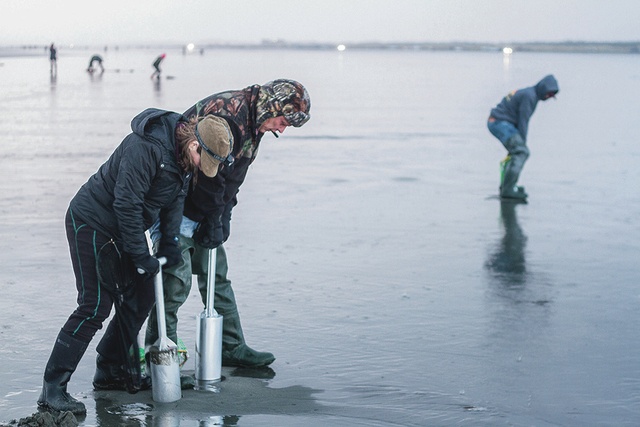OLYMPIA – The Washington Department of Fish &Wildlife has canceled five days (Nov. 12-16) from a razor clam dig that was tentatively planned at Twin Harbors and Long Beach, due to elevated marine toxin levels.
However, shellfish managers still hope to move forward with three days of digging (Nov. 17-19) at four Washington ocean beaches, pending the results of further testing for domoic acid. A natural toxin produced by certain types of algae, domoic acid can be harmful or even fatal if consumed in sufficient quantities.
Neither Long Beach nor Twin Harbors have met state public health standards for toxins. Those beaches could be in the clear for the Nov. 17 opening if additional testing shows toxin levels have dropped, said Dan Ayres, coastal shellfish manager for Fish &Wildlife.
Levels of domoic acid have been elevated for several weeks along Washington’s southern coast, at Long Beach and Twin Harbors. However, toxin levels along the northern coast, at Copalis and Mocrocks, have consistently met state health standards in recent months.
Both Copalis and Mocrocks are also being considered for the Nov. 17 opening by Fish &Wildlife.
“We’re optimistic that we’ll be able to open at least a few of the beaches on Nov. 17,” Ayres said.
Ayres anticipates announcing test results by Nov. 15. Diggers should check Fish &Wildlife’s webpage at http://wdfw.wa.gov/
Domoic acid has posed a problem for Washington’s razor clam fisheries over the last 18 months. Elevated toxin levels have prompted Fish &Wildlife to occasionally close beaches to digging.
“We’re off to a bit of rocky start with this fall’s razor clam digs,” Ayres said. “But we’ll give the green light on digs as soon as we know the clams are safe to eat.”
More information about razor clams and domoic acid can be found on Fish &Wildlife’s webpage at http://wdfw.wa.gov/fishing/shellfish/razorclams/



